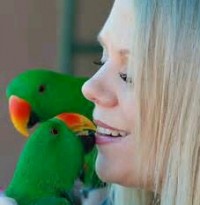Basic Bird Care
Whether we are talking about Budgies or Macaws, the basic needs for all these birds are the same. I will be talking about basic care here. Within the individual species there will be differences in some nutritional needs and emotional needs. I highly recommend anyone that is interested in sharing their life with a bird to study the individual species you are interested in. Unfortunately, breeders don't give you the whole story. Why would they? Their main interest is to sell you a bird.
Should they tell you everything you would need to know, you would probably change your mind. So please before taking a parrot into your home, learn all you can. Your bird will also need basic vet care. Find an Avian Vet in your area.
Basic Food Needs
Seed should make up 25% or less of your birds diet. I also have available at all times pelleted food and egg food. Change and wash food and water bowls daily. Bacteria can grow quickly if their bowls are allowed to be dirty (which can cause a multitude of illnesses).
They need small amounts of organically grown fresh fruits and vegetables - See NYPR Proper Nutrition) as well as other healthy foods (yes. people foods). I begin breakfast everyday with fresh broccoli, carrots, cauliflower, apples, grapes and assorted other veggies, and sometimes add some scrambled eggs.
The only exceptions are avocados, caffeine, chocolate and of course alcohol these are toxic to birds. Please watch their intake of salt and sugar and keep that out of their diet. Well, so much for the old ideas of here is the bird and here is the seed.
The other things that should NOT be fed in large quantities, are sunflower seeds and peanuts. Sunflower seed is high in fat and low in nutrition, birds will become addicted to them and not want anything else, which will cause an overweight and malnourished bird that leads to liver disease and eventually death.
Peanuts are not actually a nut, they are a legume and they can carry a fungus that can cause aspergillus. Which can be deadly.
So the proper ratio of food for your parrot is, 25% good quality seed, 25% quality organic pellet, 25% fresh fruits, and 25% fresh veggies. (Organicly Grown or Grow your own)
Housing
These birds are not domestic animals, they were meant to fly free and forage in the forest and be with their flock, but we have taken all that away from them by buying them from breeders and pet stores. The demand goes up and the breeding continues without educating the new owners. The bird gets stuck in a cage in the corner of the living room, that is until they find out how messy and loud the bird is and then they are banished to the basement or worse.
To me, there is no cage that would be too large. Buy the largest one you can afford and even then make sure the birdies have as much time out of that cage that you can give them (a minimum would be 6 hours a day or more (As Recommended by NYPR). Use newspaper on the bottom of the cage, that way you can keep an eye on droppings (one of the first signs of illness) and the print retards bacteria growth. Change it every 2 days.
Don't use the cob or the shavings in the bottom, it promotes bacteria growth within hours if it gets wet (which it will). I guess I keep putting myself in the place of the bird, we clip their wings, and put them in a cage in the corner, and just feed the same old seeds everyday, I would say that the quality of life would not be there. These birds have the intelligence level of a 5 to 6 year old child.
Would you do these things to your children? The thought nowadays is to build flight cages to add non toxic plants to their areas, to try to give them a more natural area. There is a wonderful group that now teaches how to build flight cages for you homes, www.naturalbird.com.
Go visit and see the wonderful housing they are doing now. The point I am trying to make is, these birds were not born into this lifestyle, they did not ask to be here, but here they are, and now it is our responsibility to give them the best possible life we can give them. We make ourselves responsible for their lives by having one as a companion.
MINIMUM cage recommended requirements:
Parakeets, Cockatiels, Lovebirds, Quakers, Ringnecks, Conures, Pionus, Lories, Meyers, Senegals: 30”w X 24”d
African Greys, Small Cockatoos, Eclectus, Amazons, Small Macaws: 36”w x 24”d
Larger Cockatoos and Macaws: 48”w x 36”d
We recommend 64”w x 32”d or 80”w x 40”d cages for the larger birds (Moluccans and Greenwing Macaws).
Make sure bar spacing is appropriate for your bird.

